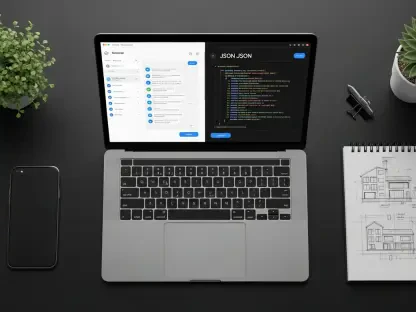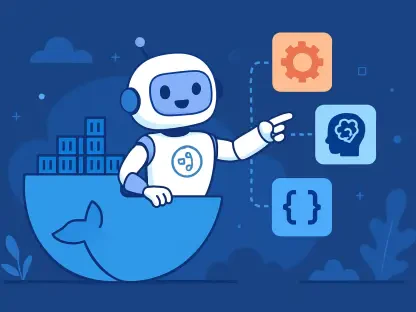As modern AI applications evolve to tackle more complex tasks, integrating browser functionality becomes critical to their success. However, bridging the gap between browser automation and AI logic presents several challenges for developers. Traditional methods such as Puppeteer, Selenium, and Playwright, despite their capabilities, demand an intricate understanding of web automation frameworks. This scenario often translates into extended development time and increased complexity. Enter Steel.dev, an open-source solution designed to abstract these complexities, thereby enabling developers to focus primarily on AI logic.
The Challenges of Traditional Web Automation Tools
The Learning Curve of Puppeteer
Puppeteer, a well-known web automation framework, offers powerful capabilities but requires detailed scripting and in-depth knowledge to manage headless browsers effectively. Developers must write elaborate scripts to perform tasks like data extraction, form completion, and website navigation. The need for precise scripting not only lengthens the development cycle but also necessitates a higher level of expertise in web technologies. Although experienced developers can leverage Puppeteer’s advanced features, the tool’s intricacies often create barriers for those less familiar with headless browser management.
Moreover, managing these scripts becomes an ongoing maintenance task as websites evolve and modify their structures. Developers are frequently required to update automation scripts to keep pace with these changes, which adds another layer of complexity. A single minor change on a target website can render an automation script obsolete, leading to significant downtime as developers troubleshoot and adapt their code. This maintenance burden is a critical drawback that hinders the efficient use of Puppeteer in dynamic web environments.
Selenium’s Comprehensive Yet Complex Nature
Selenium is another popular framework, renowned for its comprehensive suite of tools that support browser automation across different platforms. However, its steep learning curve and relatively dated functionalities pose significant challenges. While Selenium is thorough and powerful, mastering it requires considerable time and dedication. Developers must familiarize themselves with numerous commands, configurations, and best practices to utilize Selenium effectively. This investment in learning can be a substantial hurdle, especially for projects that demand quick turnaround times or those with limited resources.
Even when developers overcome the initial learning curve, they may find themselves limited by Selenium’s somewhat outdated functionalities. As modern web applications become more sophisticated, the need for cutting-edge automation tools becomes ever more pressing. Selenium, although robust, sometimes falls short in accommodating the latest trends and technologies in the web landscape. Developers often need to supplement Selenium with additional libraries or custom code to achieve their automation goals, further complicating the development process.
Advanced yet Demanding Playwright
Playwright, an advanced tool from Microsoft, provides a more modern approach to browser automation but still necessitates significant technical effort. It offers support for multiple browsers and introduces innovative features like automatic wait mechanisms. While these advancements are impressive, developers must still engage deeply with the tool’s API and configuration options. The necessity for extensive knowledge and careful scripting persists, making the automation process demanding and resource-intensive. Playwright’s capabilities certainly enhance developer productivity, but mastering its features requires a substantial investment of time and effort.
Furthermore, Playwright’s advanced functionalities, while beneficial, can sometimes introduce their own set of complexities. For instance, managing multiple browser contexts or dealing with intricate automation scenarios may require a high degree of expertise. While Playwright simplifies certain aspects of automation, it simultaneously raises the bar for technical proficiency. This duality can be a stumbling block for teams that seek to leverage cutting-edge automation technologies without extensive training or ramp-up periods.
Steel.dev: A Game Changer in Web Automation
Abstraction Through a RESTful API
Steel.dev emerges as a game-changer by abstracting the complexities of web automation into a RESTful API. This innovation allows developers to sidestep the intricate details of traditional frameworks and concentrate on AI application logic. Steel.dev’s modular architecture is composed of a RESTful API for seamless communication, a central Steel Server to manage browser instances, and Steel Workers to execute commands. These components interact harmoniously with headless browsers via Puppeteer, ensuring tasks such as data extraction, form completion, and navigation are performed efficiently.
The abstraction provided by Steel.dev significantly reduces the barriers to entry for developers who may lack extensive web automation expertise. By presenting a simplified interface, Steel.dev democratizes access to powerful browser automation capabilities. Developers can focus their efforts on refining AI algorithms and enhancing overall application functionality without being bogged down by the intricacies of web automation. This shift in focus can lead to faster development cycles and more robust AI solutions.
Modular Architecture for Scalability
One of the standout features of Steel.dev is its ability to support scalability through a modular architecture. The central Steel Server effectively manages browser instances, while Steel Workers execute commands on isolated instances. This architecture enables parallel processing across multiple browser instances, making Steel.dev suitable for large-scale projects. The system’s scalability ensures it can handle increasingly complex automation tasks as project requirements evolve. This capability is particularly beneficial for AI applications that need to process vast amounts of data from multiple sources simultaneously.
While the abstraction provided by Steel.dev may introduce minor performance overheads compared to tailor-made Puppeteer scripts, the benefits in terms of development speed and maintenance are significant. Developers no longer need to adjust automation scripts frequently in response to website changes, as the Steel Server and Workers handle these updates seamlessly. This reduction in maintenance workload allows development teams to allocate their resources more efficiently, focusing on enhancement and innovation rather than troubleshooting and script adjustments.
Conclusion
As modern AI applications continue to develop and take on more intricate tasks, incorporating browser functionality becomes essential for their success. Despite the capabilities of traditional methods like Puppeteer, Selenium, and Playwright, these tools require a deep understanding of web automation frameworks, which can lead to prolonged development times and increased complexity. Developers often struggle with the challenging bridge between browser automation and AI logic. This is where Steel.dev comes into play—a powerful open-source solution designed to simplify these challenges. Steel.dev abstracts the intricacies associated with web automation, allowing developers to concentrate more on the AI logic itself rather than getting bogged down with complex web automation details. Consequently, Steel.dev significantly reduces the overhead and intricacies involved in combining browser automation with AI, streamlining the development process. By providing this abstraction, Steel.dev enables developers to accelerate their projects and brings advanced AI applications closer to practical implementation.









